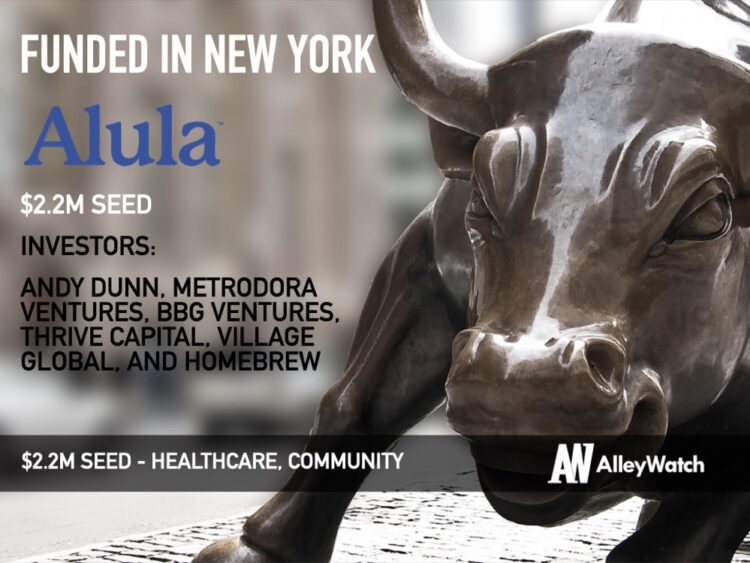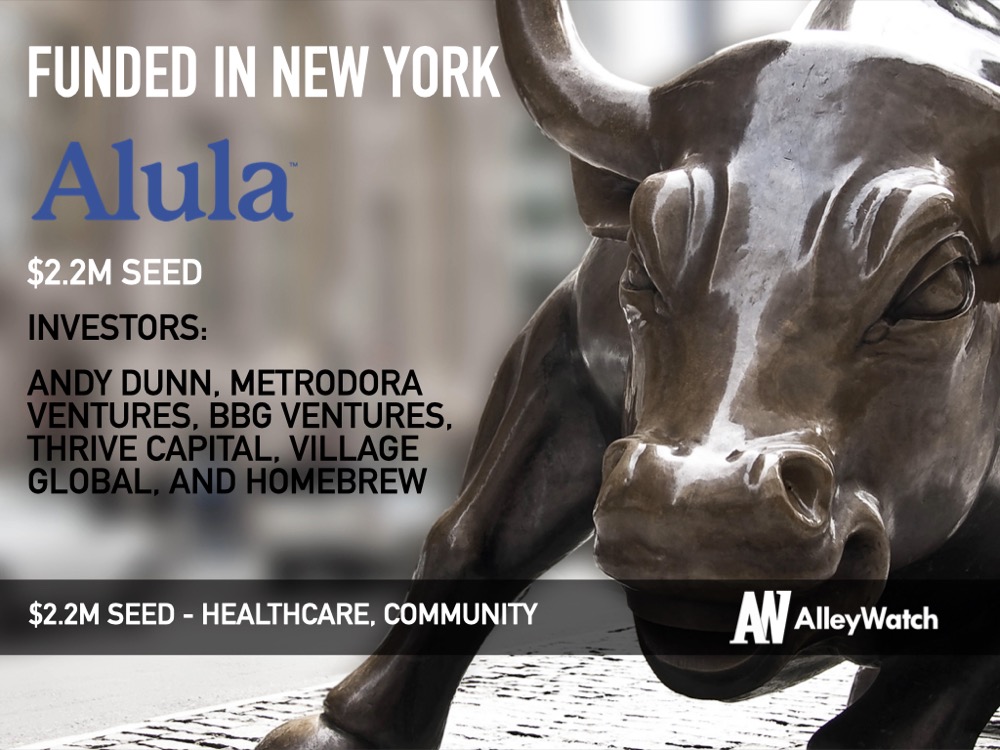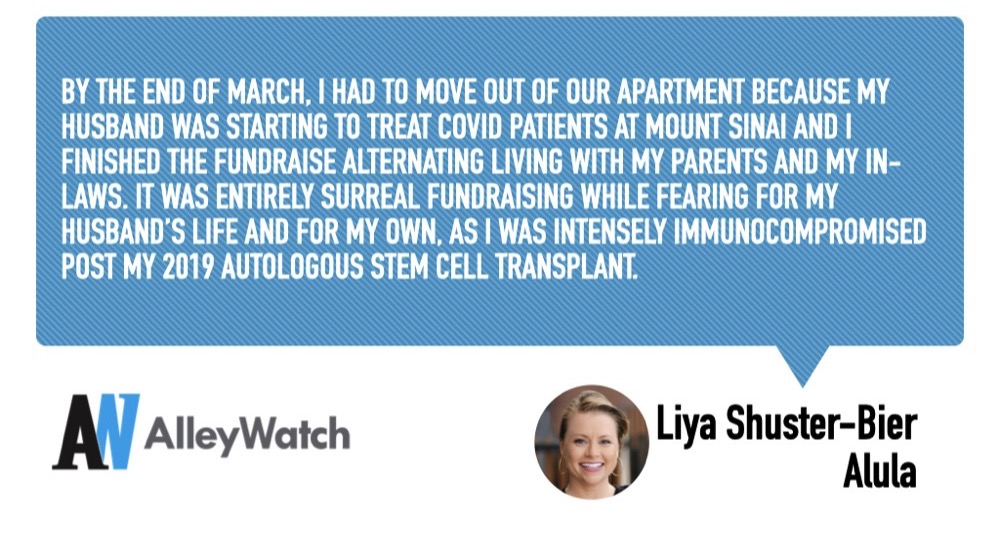The anguish of dealing with cancer is difficult for patients and their families. Millions of peoples’ lives are uprooted annually and the process of managing and treating this disease can be extremely taxing, isolating, and challenging. Alula is a digital support platform for those with cancer, their families, and their caregivers to serve as a trusted and centralized destination to make the process of managing cancer a little easier. The platform’s signature features include communication and scheduling tools, a vetted product marketplace that addresses the needs of this specific patient population, and a knowledge center that provides accurate information on treatments and patient experience.
AlleyWatch caught up with CEO and Founder Liya Shuster-Bier to learn more about how her personal experience as a patient and caregiver inspired the platform, the company’s growth plans, and recent round of funding.
Who were your investors and how much did you raise?
We’ve raised $2.2M in seed funding from some of the most admired VCs and angel investors including Andy Dunn, Chelsea Clinton’s Metrodora Ventures, BBG Ventures, Thrive Capital, Village Global, and Homebrew.
Tell us about the product or service that Alula offers.
It’s impossible to talk about our product and services without first sharing my personal story. The concept for Alula arose out of five years of painful, unintended, and unplanned research and development. My mother was diagnosed with breast cancer in January 2016, and a few months after she was finally in remission, I was diagnosed with stage 2 primary mediastinal b-cell non-Hodgkin lymphoma (I’ve been in remission for nearly 2 years).
What I soon came to realize is that the management of side effects and after-effects of cancer treatment persisted outside the hospital room, and that’s where it truly became difficult to ask for help.
Until now, patients and their caregivers — as well as their wider support network — haven’t had a one-stop-shop for help dealing with all the complexities of life with cancer. Alula’s mission is clear: to support patients, families, and friends through the entire lifecycle of cancer, from diagnosis and treatment to recovery and (sometimes) bereavement. By organizing a revolutionary support system, we can truly transform the patient experience in a few key ways:
- Products and Patient Gift Registries: When going through treatment, my medical bills made up only 24% of my total cost of care. My amazing friends and family sent fuzzy blankets, books, wine and motivational socks, but what I needed was the right gauze, band-aids and ointments after a surgery, and special shampoos and cleansers for hair loss. Alula’s marketplace of products is curated by cancer patients for these needs and guided by our advisory board of medical experts.
- Communication and Treatment Logistics Tools: We’ve built powerful digital tools that help patients and their support system navigate cancer. Whether finding the right words for the hardest email you’ve ever had to write through customizable templates, or finding a friend to drive you to the doctor through sharable treatment calendars, Alula is digitizing all the needs of patients outside of the hospital.
- Resources and Trustworthy Content: Alula is a place of truth for how to live with cancer. By centralizing the information you need to know (the kind that I only discovered in conversations between cancer-friends and scattered corners of the internet) Alula is translating the knowledge of others’ lived experiences into an unparalleled, radically honest resource. It’s a club no one asks to join, but one that nevertheless needs a common language and trusted communication between members.
 What inspired the start of Alula?
What inspired the start of Alula?
As many cancer patients will tell you when the doctor walks in and mutters the words “I’m sorry to tell you, but…” there’s nothing that can prepare you for that moment. And, there’s little that prepares you for what comes next.
After receiving my diagnosis, what I soon came to realize is that so much of my experience living with cancer would extend far beyond getting the right curative treatment in the hospital. Beyond the hospital room, no one was helping me organize my life with cancer. There was no playbook to explain how I should tell my friends and family the news. There was little guidance on how to prepare for the hair loss I incurred as a result of the chemotherapy (when the time came to purchase a wig, I wasn’t sure where and how to begin shopping for one). Daily decisions, like whether or not to return to the office after my second radiation session of the day, added to the burden.
It took a ton of time, scouring corners of the internet to find information and learn tips from intimate conversations with my cancer-friends, and it was only then that I felt like I had gained the knowledge and resources that I needed. The problem was that by the time I had learned everything I needed to know, I had completed treatment.
It was this experience – not knowing where to turn – that led me to build Alula, a platform that helps other patients feel more prepared than I was.
How is Alula different?
While there are other information-sharing platforms for cancer, we’re the first to centralize all of the information in one place. We’ve built a modern space for patients and caregivers, utilizing my own experience to better coordinate care across people’s support systems and provide education and guidance on everything.
What market does Alula target and how big is it?
There are close to 17 million cancer survivors in the United States, according to the National Cancer Institute. And 85 million immediate family members act as direct caregivers to those patients. Over 425 million people — coworkers, extended families, and friends — consider themselves an important part of a cancer patient’s global support network.. Alula was built to uniquely support them all.
What’s your business model?
Alula was intentionally built to ease the burden on cancer patients and families, so all our services are free to use. The platform’s monetization will evolve as offerings continue to expand, but currently, Alula’s main stream of revenue is through an affiliate commerce program with the brands being sold through its marketplace.
How has COVID-19 impacted the business?
One of the biggest impacts from COVID was that we had to build our entire team remotely, and we still haven’t been able to meet in person all together. But, we’ve built an incredible team with the best talent from companies like Care/Of, Jetblack, Oscar Health, Maven Clinic, and Thrive Global and have been able to connect and bond virtually over our common goal of making cancer less lonely.
What was the funding process like?
Though I just announced, I completed the fundraise last May, commencing in late January, right as pandemic fears were starting to creep in. I had my first and second meetings with many investors in person, over coffees throughout the city. By the 5th of March, I decided to transition to Zoom meetings, when San Francisco began shutting down, and I closed my first SAFE the Friday before the markets collapsed by 20%. By the end of March, I had to move out of our apartment because my husband was starting to treat COVID patients at Mount Sinai and I finished the fundraise alternating living with my parents and my in-laws. It was entirely surreal fundraising while fearing for my husband’s life and for my own, as I was intensely immunocompromised post my 2019 autologous stem cell transplant.
What are the biggest challenges that you faced while raising capital?
Raising at the beginning of the pandemic was a historic challenge. I had to decide to prioritize my health risks before the general norms of virtual meetings and pitches changed. Managing my anxiety about my husband’s risks on the frontlines, when there was limited PPE, was incredibly taxing. And, of course, at that time, we had yet to know how the world would change as it would impact Alula, such as the flourishment of e-commerce and telemedicine, but also the more-than-ever need for digital planning of your healthcare and your support team. There were so many existential unknowns both for the business and for my personal life.
What factors about your business led your investors to write the check?
No one is untouched by cancer, and many of our investors have personally faced the difficult experience of caring for loved ones with cancer. Many of them have said to me, “I wish Alula existed when my mom/brother/friend/coworker was going through it.”
What are the milestones you plan to achieve in the next six months?
Right now, we’re focused on getting the Alula platform into patients’ hands, and we’re excited to expand our digital tools and product offerings later this spring.
What advice can you offer companies in New York that do not have a fresh injection of capital in the bank?
Tap into new networks that can quickly plug you into other founders. I joined Grand Central Tech as a founder-in-residence last January and it transformed my understanding of what’s possible by connecting me to other founders and founding teams building zero-to-one businesses.
Where do you see the company going now over the near term?
One of the most exciting things on the horizon for us is expanding our institutional partnerships with hospital systems and medical providers. Through these partnerships, Alula will be able to uniquely uplift standards of onco-care. Among our many goals, we’ll be able to help doctors understand the impact of medical interventions, such as over-the-counter treatments, help shed light on patient side effects, and help integrate at-home remedies with oncology protocols.
One of the most exciting things on the horizon for us is expanding our institutional partnerships with hospital systems and medical providers. Through these partnerships, Alula will be able to uniquely uplift standards of onco-care. Among our many goals, we’ll be able to help doctors understand the impact of medical interventions, such as over-the-counter treatments, help shed light on patient side effects, and help integrate at-home remedies with oncology protocols.
What’s your favorite outdoor dining restaurant in NYC
I haven’t outdoor dined once yet because of my compromised immune system, but Di An Di in Greenpoint is my favorite takeout.





